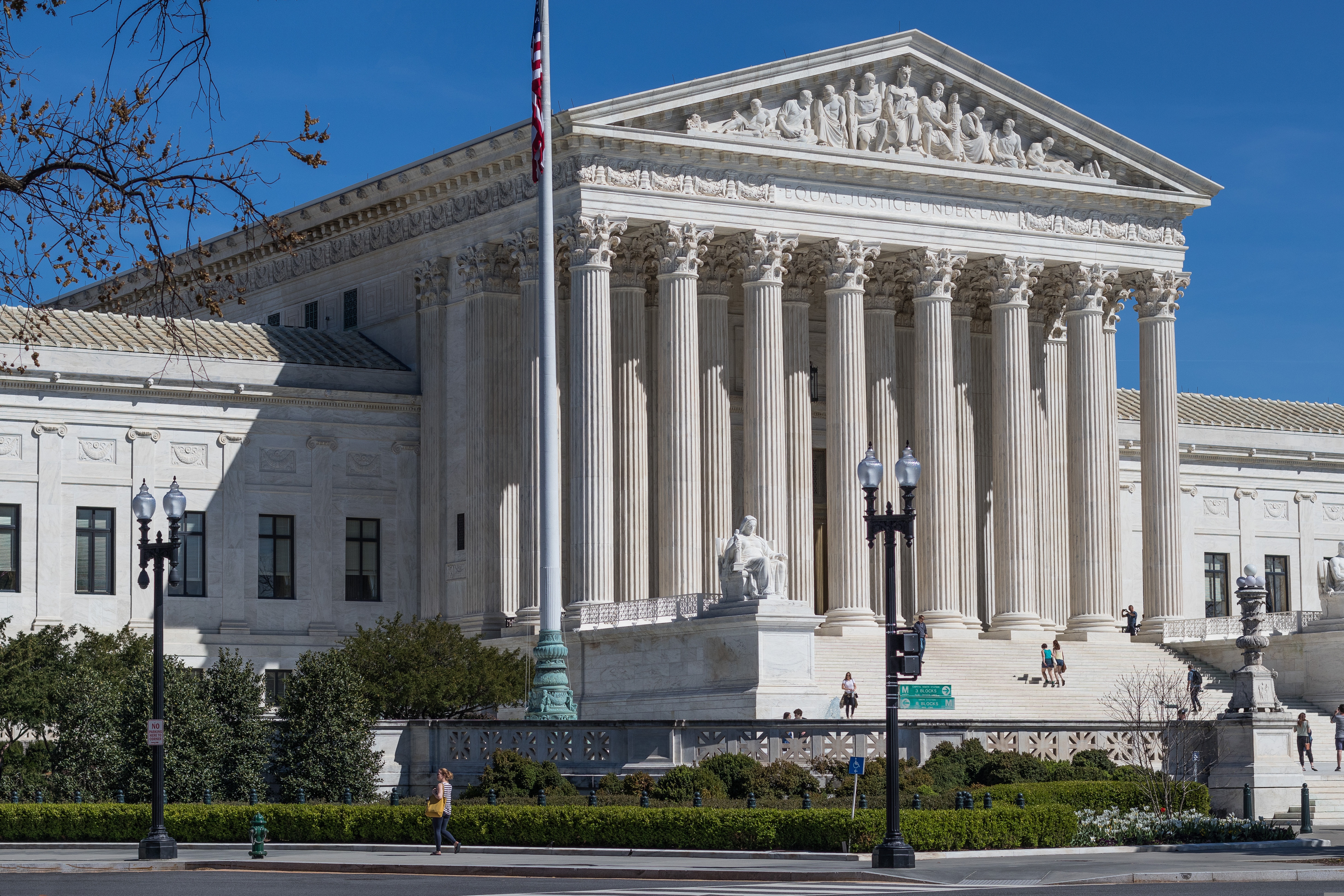Supreme Court Allows Trump to Implement Transgender Military Ban

WASHINGTON, D.C. (WE) — In a major legal victory for President Donald Trump, the Supreme Court of the United States on Tuesday allowed his administration to enforce a ban on transgender individuals serving in the U.S. military. The justices granted an emergency request to lift a nationwide injunction that had previously blocked the policy’s implementation, while legal challenges continue in lower courts.
The brief order, issued without oral argument or written opinion, was supported by five conservative justices. The three liberal justices — Ruth Bader Ginsburg, Stephen Breyer, and Sonia Sotomayor — dissented. The ruling does not address the constitutionality of the ban but allows it to take effect during ongoing litigation.
The decision represents a significant setback for seven transgender plaintiffs, led by Commander Emily Shilling, a decorated U.S. Navy pilot with nearly two decades of service. Shilling, who has flown 60 combat missions, alleged that the Navy had invested approximately $20 million in her training — resources now potentially wasted under the ban.
Background: The Trump-Era Policy
The Transgender Military Ban in question stems from a 2019 directive issued by the U.S. Department of Defense during President Donald Trump’s administration. This policy replaced a previous Obama-era policy that allowed transgender individuals to serve openly in the U.S. military.
The Trump administration claimed that the Transgender Military Ban was essential to preserving “military readiness” and “unit cohesion,” referencing a Pentagon report which argued that service members with gender dysphoria threatened “military effectiveness and lethality.”
Under the controversial Transgender Military Ban, individuals diagnosed with gender dysphoria or who had undergone gender-affirming surgery were “generally disqualified from military service.” However, the policy included narrow exceptions and a grandfather clause allowing those already serving openly to remain in uniform.
In court filings defending the Transgender Military Ban, Solicitor General D. John Sauer argued that courts are obligated to show “substantial deference” to military decisions, particularly those involving national defense. “Judicial interference in military affairs poses a grave risk to national security,” Sauer asserted.
Legal Challenges and Lower Court Rulings
The Trump-era ban was challenged in multiple courts across the country. In one notable case, U.S. District Judge Benjamin Settle in Washington state issued a nationwide injunction on March 27, arguing that the ban was likely unconstitutional. “This is not an especially close question,” Judge Settle wrote, stating the policy was “based on unsupported assertions” rather than empirical military needs.
That injunction was allowed to stand by the 9th U.S. Circuit Court of Appeals, based in San Francisco, prompting the Trump administration to seek relief from the nation’s highest court.
Meanwhile, a separate injunction issued by a federal judge in Washington, D.C. was put on hold by the U.S. Court of Appeals for the D.C. Circuit while arguments continue on its permanence. That court has yet to issue a final ruling.
Human Rights and Legal Advocacy Reaction
Lambda Legal and the Human Rights Campaign Foundation, which represent several of the plaintiffs, issued a joint statement expressing profound disappointment.
“Today’s Supreme Court ruling is a devastating blow to transgender service members who have demonstrated their capabilities and commitment to our nation’s defense,” the organizations said. They called the ban “a policy rooted not in military necessity, but in bigotry and fear.”
According to Lambda Legal’s legal brief, the ban violates the 14th Amendment of the U.S. Constitution, which guarantees equal protection under the law. “An unprecedented degree of animus towards transgender people animates and permeates the ban: it is based on the shocking proposition that transgender people do not exist,” the lawyers wrote.
Historical Deference to Military Discrimination
The Supreme Court has long upheld a tradition of granting the military extraordinary latitude, even in situations that would be considered unconstitutional in civilian society.
In Goldman v. Weinberger (1986), the Court ruled that the U.S. Air Force could bar a Jewish officer from wearing a yarmulke, citing the need for uniformity and discipline. Similarly, in Rostker v. Goldberg (1981), the Court upheld the male-only draft registration requirement, arguing that military affairs are largely immune from standard constitutional scrutiny.
These precedents played a key role in the Trump administration’s defense of its transgender ban. “The military must foster instinctive obedience, unity, commitment, and esprit de corps,” the Goldman ruling stated, reinforcing the argument that special rules apply within the armed forces.
Read More:
- Mike Waltz to Exit White House Amid Signal Chat Fallout
- Zelle Returns Online After Nationwide Outage Affecting Bank Customers
- New Jersey Teen Charged With Arson in 15,000-Acre Wildfire That Prompted Mass Evacuations
Biden Reversal and Policy Whiplash
In January 2021, shortly after taking office, President Joe Biden issued an executive order overturning Trump’s transgender military ban. He stated that “all Americans who are qualified to serve in the Armed Forces of the United States should be able to do so regardless of their gender identity.”
Under Biden’s directive, the Pentagon halted discharges based on gender identity and resumed the enlistment of transgender recruits. However, the legal whiplash and ongoing litigation created confusion and instability within the ranks.
Military branches including the U.S. Army, Marine Corps, and U.S. Air Force issued internal memoranda to comply with the shifting policies. Advocacy groups warned that the reversals jeopardized military cohesion and morale.
A Highly Qualified Plaintiff
Commander Emily Shilling is perhaps the most high-profile face of the lawsuit. With 19 years of service and dozens of combat missions under her belt, she exemplifies the qualifications the military typically celebrates.
According to court documents, the U.S. Navy spent approximately $20 million on her specialized training, including time at the elite Naval Air Station Whidbey Island in Washington state. There is no indication that she has ever faced disciplinary issues or performance concerns.
“The loss of this talent is not only tragic on a personal level but a grave strategic error,” wrote Judge Settle in his opinion. “The Constitution may not prohibit foolish policies, but it surely does not require the courts to ignore discrimination.”
Broader Implications for Transgender Rights
The Supreme Court’s decision to allow the ban to proceed while litigation continues is not the same as a final judgment on its legality. However, legal scholars argue it signals a broader unwillingness from the current conservative majority to champion transgender rights.
In the landmark Bostock v. Clayton County (2020), the Court ruled that discrimination against transgender employees constitutes illegal sex discrimination under Title VII of the Civil Rights Act of 1964. That case was decided 6-3, with Justice Neil Gorsuch writing the majority opinion.
But Bostock pertained to civilian employment. Military matters, governed by different legal precedents, are far more insulated from constitutional review.
Ongoing Litigation and Future Outlook
The cases challenging the ban continue to move through the courts. While the Supreme Court has allowed the policy to be enforced for now, it has not rendered a final decision. Legal experts say that if the ban ultimately reaches the Court on its merits, the justices may again be asked to weigh deference to the military against constitutional protections.
Meanwhile, LGBTQ+ advocacy groups vow to continue fighting. “We are not deterred,” said GLBTQ Legal Advocates & Defenders (GLAD), another organization involved in the lawsuit. “This is not the end of the road.”
Veterans groups including American Veterans for Equal Rights (AVER) and OutServe-SLDN also condemned the decision. “Transgender service members have repeatedly proven their value, skill, and bravery,” they said in a joint letter.
Public Opinion and Congressional Response
Polling from the Pew Research Center shows that a majority of Americans support allowing transgender people to serve in the military. Among younger voters and veterans under 35, support is even higher.
In Congress, some members have pledged to pursue legislative remedies. Senator Tammy Duckworth (D-Ill.), an Iraq War veteran, said the policy “sends the wrong message about who is fit to serve.” Representative Adam Smith (D-Wash.), then-chair of the House Armed Services Committee, introduced legislation that would ban discrimination based on gender identity in the military.
However, the deeply divided nature of Congress makes the path to new legislation uncertain.
The Supreme Court’s decision to allow Trump’s transgender military ban to go into effect — even temporarily — is a sobering reminder of the unique latitude the military holds in crafting personnel policy. While the fight for equality continues in courtrooms and on Capitol Hill, for now, thousands of transgender Americans face new uncertainty about their futures in uniform. The high stakes — for individuals like Commander Emily Shilling and for the nation’s military effectiveness — make this a defining moment in the intersection of civil rights and national defense.















